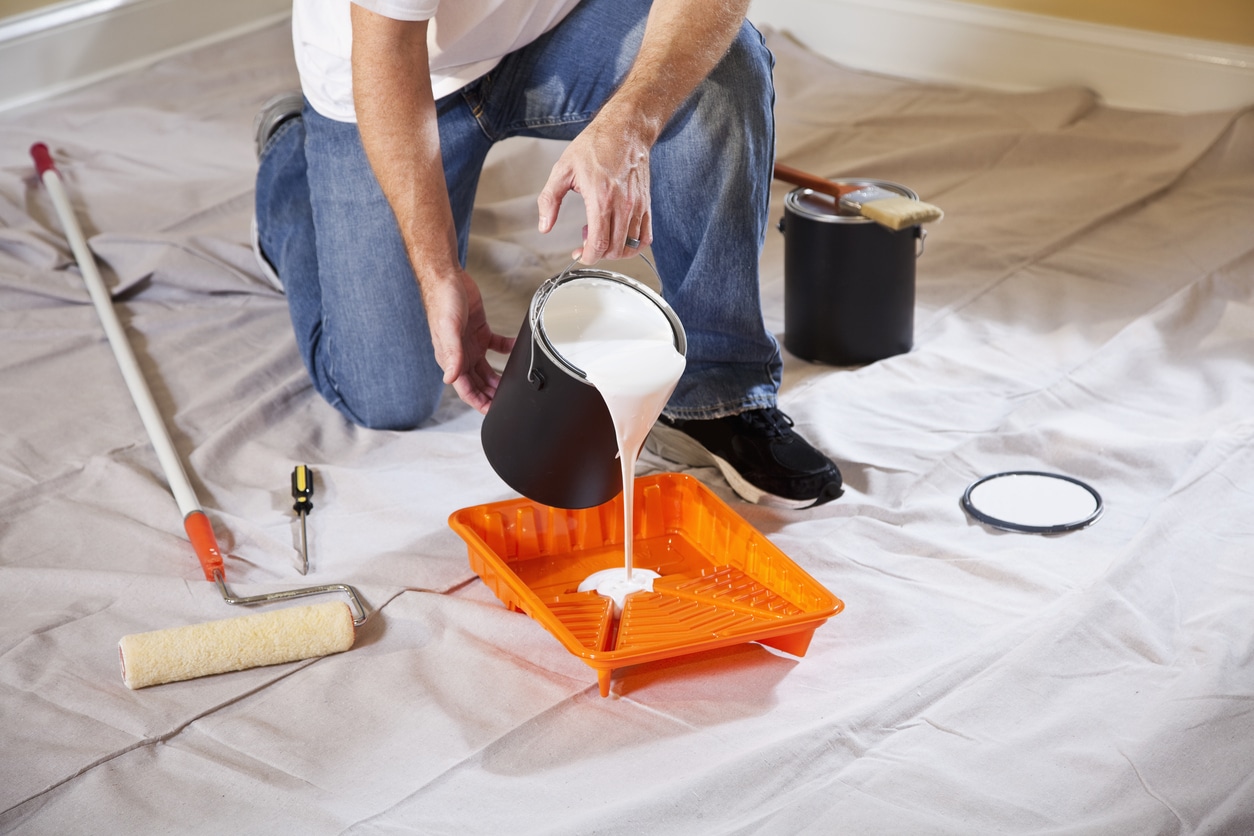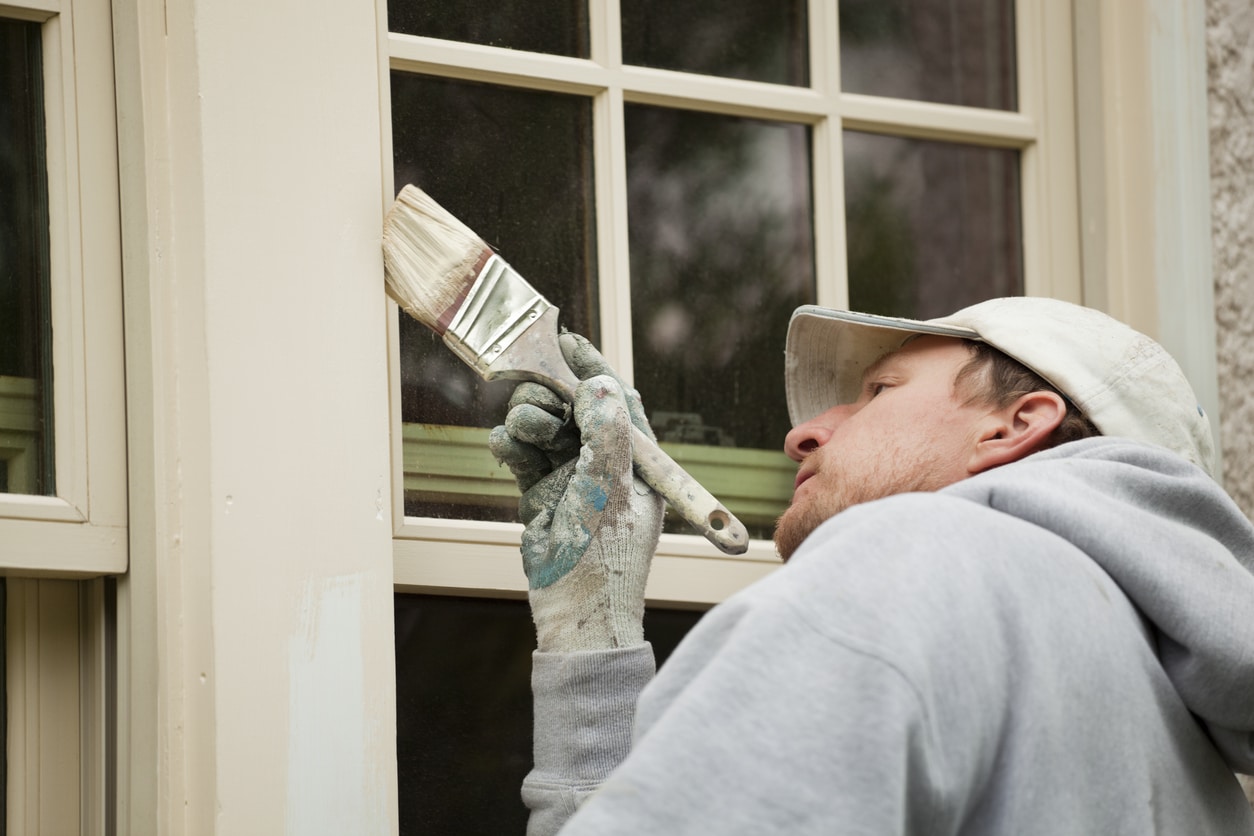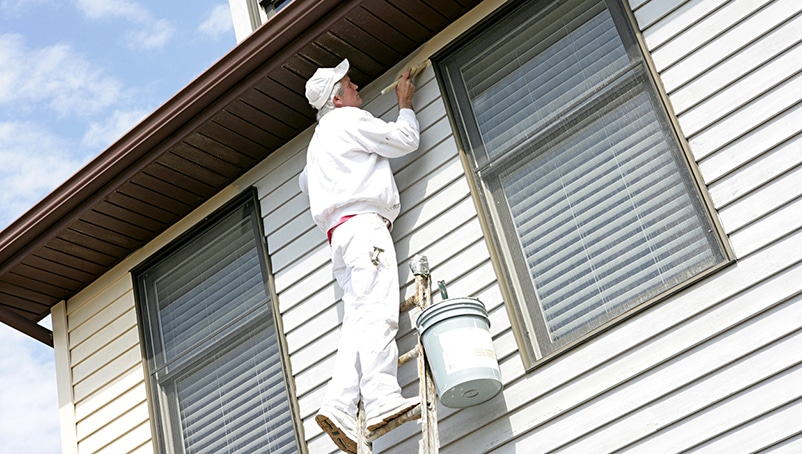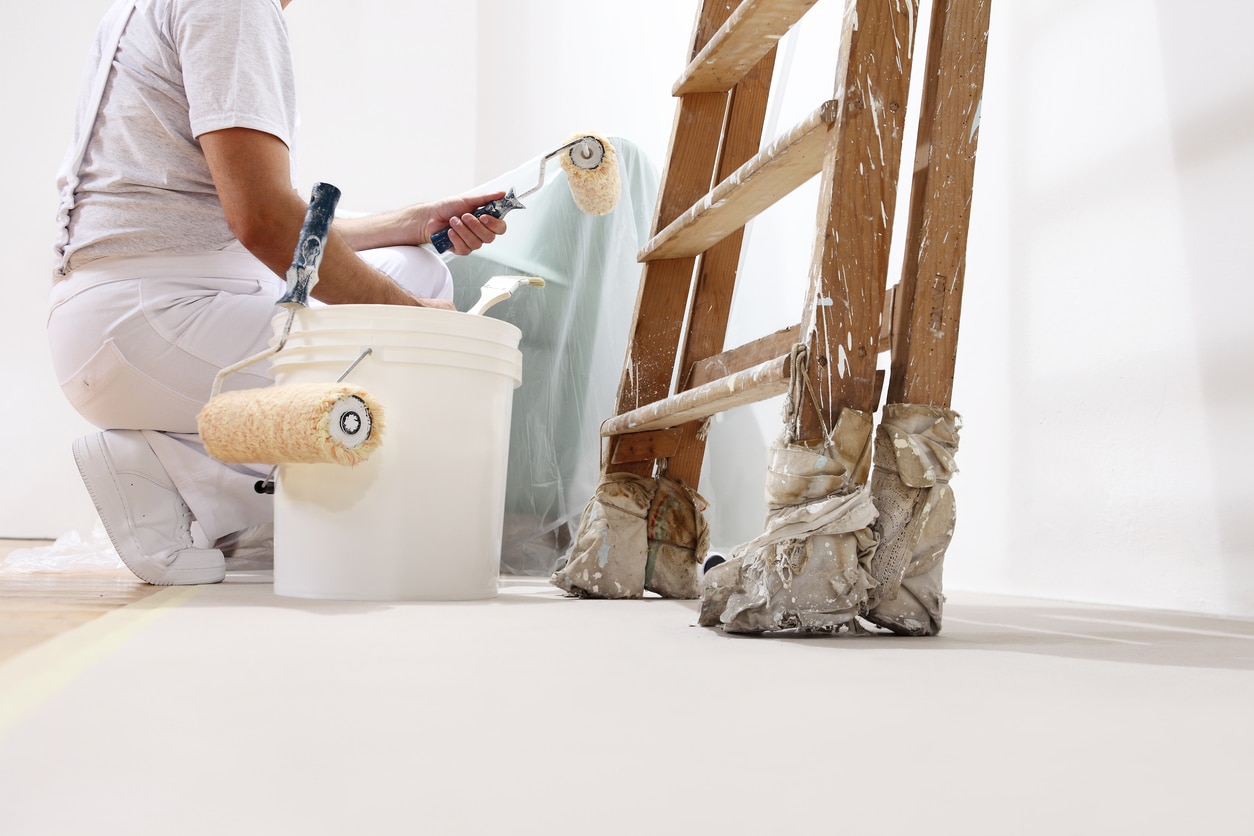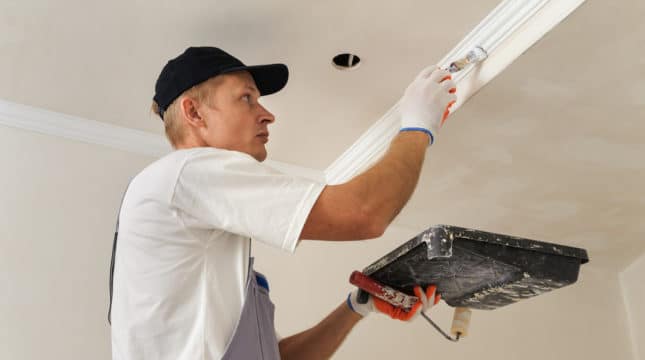Nevada
State license: Yes Business registration: Yes
Painters in Nevada must be licensed and hold a Nevada Painting and Decorating Painting License. They must also register their business with Nevada’s Secretary of State.
License applicants must be pre-approved to take the exam and will need to pass a trade exam and a business and law exam. To qualify for a license, applicants must show four years of experience from the last 15 years, submit financial statements, and have a surety bond and workers’ comp insurance if applicable.
Required business insurance in Nevada:
- Nevada requires workers’ compensation if you have any employees.
- If you drive for work-related tasks, you may need commercial auto coverage. Nevada’s minimum motor vehicle requirements are $25,000 per person / $50,000 per accident / $20,000 property damage.
New Hampshire
State license: No Business registration: Yes
Construction contractors, including painting contractors, do not need to be licensed in the state of New Hampshire. There may be local licensing requirements. Businesses must register with the state.
Individuals cannot perform lead abatement or lead inspection work in New Hampshire without a valid license. All applicants must attend training through an approved provider licensed by the Division of Public Health Services.
Required business insurance in New Hampshire:
- New Hampshire requires workers’ compensation if you have one or more employees.
- If you drive for work-related tasks, you may need commercial auto coverage. New Hampshire’s minimum motor vehicle requirements are $25,000 per person / $50,000 per accident / $25,000 property damage.
New Jersey
State license: No Business registration: Yes
In New Jersey, you only need to register to become licensed as a contractor in the state. Painters fall under the umbrella of home improvement contractors and must register with the Division of Consumer Affairs.
All registered painters must have a registration badge and display their registration number in their place of business on all business documents and all advertisements.
All individuals who work with lead-based paint must have a NJ Department of Health lead permit.
Required business insurance in New Jersey:
- Home improvement contractors must have general liability insurance of not less than $500,000 per occurrence.
- New Jersey requires workers’ compensation if you have any employees.
- If you drive for work-related tasks, you may need commercial auto coverage. New Jersey’s minimum motor vehicle requirements are $15,000 per person / $30,000 per accident / $5,000 property damage.
New Mexico
State license: No Business registration: Yes
Painters don’t need to get a license from the state as of 2016. But cities and counties may have license rules, so painters should check with local governments before taking on jobs.
Required business insurance in New Mexico:
- New Mexico requires workers’ compensation if you have three or more employees.
- If you drive for work-related tasks, you may need commercial auto coverage. New Mexico’s minimum motor vehicle requirements are $25,000 per person / $50,000 per accident / $10,000 property damage.
New York
State license: No Business registration: Yes
New York State does not require a painter’s license at the state level; however, there are requirements at the local government level. Businesses must also register their business.
For example, painters in New York City require a Home Improvement Contractor License, which the NYC Department of Consumer Affairs awards. Applicants must pass a Home Improvement exam and show proof of insurance to obtain a license. The license lasts for two years and must then be renewed.
Required business insurance in New York:
- New York requires workers’ compensation if you have any employees.
- If you drive for work-related tasks, you may need commercial auto coverage. New York’s minimum motor vehicle requirements are $25,000 per person / $50,000 per accident / $10,000 property damage.
North Carolina
State license: No Business registration: Yes
Contractors in North Carolina must hold a license to bid on and work on jobs costing $30,000 or more. They must also register their business. Painting is not one of the trades classified within the NC Licensing Board for General Contractors’ license types.
In addition, any person who deals with lead-based paint must be certified by the Environmental Protection Agency and take a series of classes to receive the certification.
Required business insurance in North Carolina:
- North Carolina requires workers’ compensation if you have three or more employees.
- If you drive for work-related tasks, you may need commercial auto coverage. North Carolina’s minimum motor vehicle requirements are $30,000 per person / $60,000 per accident / $25,000 property damage.
North Dakota
State license: Yes Business registration: Yes
North Dakota requires all contractors who do work that costs more than $4,000 to be licensed in the state. To apply to be a licensed contractor, you must be registered as a business with the Secretary of State and have proof of North Dakota business insurance.
There is no exam requirement. Choose between the four classes of contractor licenses, depending on the size of the jobs you want to be licensed for.
- Class A: project exceeding $500,000
- Class B: project less than $500,000
- Class C: project less than $300,000
- Class D: project less than $100,000
Required business insurance in North Dakota:
Ohio
State license: No Business registration: Yes
The Ohio Construction Industry Licensing Board only requires specific trades to obtain contractor licenses; painters are not included in the requirement. However, home improvement and general contractors in Ohio must be licensed or registered at the local level, with specific requirements depending on the city.
The Ohio Department of Health Lead Poisoning Prevention Program oversees safe and proper lead abatement, detection and analytical services. The program licenses lead-baed activities.
Required business insurance in Ohio:
- Ohio requires workers’ compensation if you have any employees, purchased through a state agency.
- If you drive for work-related tasks, you may need commercial auto coverage. Ohio’s minimum motor vehicle requirements are $25,000 per person / $50,000 per accident / $25,000 property damage.
Oklahoma
State license: No Business registration: Yes
In Oklahoma, general contractors and subcontractors who provide general construction services, including painters, are not required to hold a state license. Counties, towns and cities may have local license requirements.
The Department of Environmental Quality oversees certification of firms and contractors who work with lead-based paint or perform renovations in potentially contaminated areas.
Required business insurance in Oklahoma:
- Oklahoma requires workers’ compensation if you have five or more employees.
- If you drive for work-related tasks, you may need commercial auto coverage. Oklahoma’s minimum motor vehicle requirements are $25,000 per person / $50,000 per accident / $25,000 property damage.
Oregon
State license: Yes Business registration: Yes
In Oregon, all contractors who do any construction work to improve a property, including painters, require a state license issued by the Oregon Construction Contractors Board and register with the Secretary of State.
To obtain a license, you must complete training and take an exam. When applying, you must submit a surety bond and provide proof of general liability and worker’s compensation insurance. The license will be valid for two years.
The Oregon Health Authority (OHA) has authority from the EPA to regulate lead-based paint activities in the state. Individuals and firms conducting lead-paint activities must be trained by an authorized, accredited provider, certified by OHA and licensed by the Contractors Board.
Required business insurance in Oregon:
- Licensed contractors must have general liability insurance. The coverage amount varies — typically $100,000 per occurence.
- Oregon requires workers’ compensation if you have any employees.
- If you drive for work-related tasks, you may need commercial auto coverage. Oregon’s minimum motor vehicle requirements are $25,000 per person / $50,000 per accident / $20,000 property damage.
Pennsylvania
State license: No Business registration: Yes
The Commonwealth of Pennsylvania does not require most construction contractors to hold a license; however, under the Home Improvement Consumer Protection Act, most contractors must be registered and hold current business insurance in Pennsylvania.
Registered contractors must display their registration number on all contracts, advertisements and other business documents. Any contractors, including painters, who work with lead removal must be licensed by the state from the PA Department of Labor and Industry.
Required business insurance in Pennsylvania:
- Pennsylvania requires workers’ compensation if you have any employees.
- If you drive for work-related tasks, you may need commercial auto coverage. Pennsylvania’s minimum motor vehicle requirements are $15,000 per person / $30,000 per accident / $5,000 property damage.



